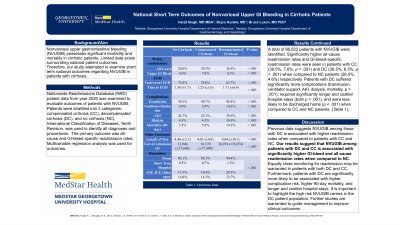Monday Poster Session
Category: Liver
P2385 - National Short Term Outcomes of Nonvariceal Upper Gastrointestinal Bleeding in Cirrhotic Patients
Monday, October 23, 2023
10:30 AM - 4:15 PM PT
Location: Exhibit Hall

Has Audio
- HS
Harjit Singh, MD
MedStar Georgetown University Hospital
Washington, District of Columbia
Presenting Author(s)
Harjit Singh, MD, Bryce Kunkle, MD, Bruce Luxon, MD, PhD
MedStar Georgetown University Hospital, Washington, DC
Introduction: Nonvariceal upper gastrointestinal bleeding (NVUGIB) possesses significant morbidity and mortality in cirrhotic patients. Limited data exists surrounding national patient outcomes. Therefore, our study attempted to examine short term national outcomes regarding NVUGIB in patients with cirrhosis.
Methods: Nationwide Readmissions Database (NRD) patient data from year 2020 was examined to evaluate outcomes of patients with NVUGIB. Patients were stratified into 3 categories: compensated cirrhosis (CC), decompensated cirrhosis (DC), and no cirrhosis (NC). International Classification of Diseases, Tenth Revision, was used to identify all diagnoses and procedures. The primary outcome was all-cause and GI-bleed specific readmission rates. Multivariable regression analysis was used for outcomes.
Results: A total of 86,022 patients with NVUGIB were identified. Significantly higher all-cause readmission rates and GI-bleed-specific readmission rates were seen in patients with CC (39.5%, 7.6%, p < .001) and DC (36.5%, 6.3%, p < .001) when compared to NC patients (26.0%, 4.6%) respectively. Patients with DC suffered significantly more complications (transfusion, ventilator support, AKI, dialysis, mortality, p < .001), required significantly longer and costlier hospital stays (both p < .001), and were less likely to be discharged home (p < .001) when compared to CC and NC patients.
Discussion: Previous data suggests NVUGIB among those with DC is associated with higher readmission rates when compared to patients with CC and NC. Our results suggest that NVUGIB among patients with DC and CC is associated with significantly higher GI-bleed and all-cause readmission rates when compared to NC. Equally close monitoring for readmission may be warranted in patients with both DC and CC. Furthermore, patients with DC are significantly more likely to be associated with higher complication risk, higher 90-day mortality, and longer and costlier hospital stays. It is important to highlight the high risk NVUGIB carries in the DC patient population. Further studies are warranted to guide management to improve clinical outcomes in this patient population.
Disclosures:
Harjit Singh, MD, Bryce Kunkle, MD, Bruce Luxon, MD, PhD. P2385 - National Short Term Outcomes of Nonvariceal Upper Gastrointestinal Bleeding in Cirrhotic Patients, ACG 2023 Annual Scientific Meeting Abstracts. Vancouver, BC, Canada: American College of Gastroenterology.
MedStar Georgetown University Hospital, Washington, DC
Introduction: Nonvariceal upper gastrointestinal bleeding (NVUGIB) possesses significant morbidity and mortality in cirrhotic patients. Limited data exists surrounding national patient outcomes. Therefore, our study attempted to examine short term national outcomes regarding NVUGIB in patients with cirrhosis.
Methods: Nationwide Readmissions Database (NRD) patient data from year 2020 was examined to evaluate outcomes of patients with NVUGIB. Patients were stratified into 3 categories: compensated cirrhosis (CC), decompensated cirrhosis (DC), and no cirrhosis (NC). International Classification of Diseases, Tenth Revision, was used to identify all diagnoses and procedures. The primary outcome was all-cause and GI-bleed specific readmission rates. Multivariable regression analysis was used for outcomes.
Results: A total of 86,022 patients with NVUGIB were identified. Significantly higher all-cause readmission rates and GI-bleed-specific readmission rates were seen in patients with CC (39.5%, 7.6%, p < .001) and DC (36.5%, 6.3%, p < .001) when compared to NC patients (26.0%, 4.6%) respectively. Patients with DC suffered significantly more complications (transfusion, ventilator support, AKI, dialysis, mortality, p < .001), required significantly longer and costlier hospital stays (both p < .001), and were less likely to be discharged home (p < .001) when compared to CC and NC patients.
Discussion: Previous data suggests NVUGIB among those with DC is associated with higher readmission rates when compared to patients with CC and NC. Our results suggest that NVUGIB among patients with DC and CC is associated with significantly higher GI-bleed and all-cause readmission rates when compared to NC. Equally close monitoring for readmission may be warranted in patients with both DC and CC. Furthermore, patients with DC are significantly more likely to be associated with higher complication risk, higher 90-day mortality, and longer and costlier hospital stays. It is important to highlight the high risk NVUGIB carries in the DC patient population. Further studies are warranted to guide management to improve clinical outcomes in this patient population.
Disclosures:
Harjit Singh indicated no relevant financial relationships.
Bryce Kunkle indicated no relevant financial relationships.
Bruce Luxon indicated no relevant financial relationships.
Harjit Singh, MD, Bryce Kunkle, MD, Bruce Luxon, MD, PhD. P2385 - National Short Term Outcomes of Nonvariceal Upper Gastrointestinal Bleeding in Cirrhotic Patients, ACG 2023 Annual Scientific Meeting Abstracts. Vancouver, BC, Canada: American College of Gastroenterology.
